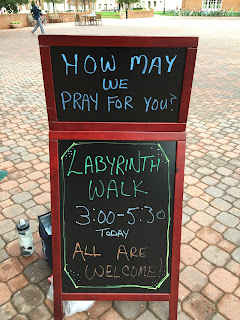I am a cradle Christian, a follower of Jesus, and an Episcopal priest.
When I worked in professional theatre, I encountered a number of people whom I call "refugees from religion." Many had once been religious and most were spiritual. But they had been hurt in the name of Christ, taught about an angry God who would condemn them for any of a number of sins, including, for some of them, being who they were. The Gospel was not good news for them but had been used to scold, to criticize, and to shame. In some cases - to destroy fragile spirits. How deeply sad I was to learn that my beloved religion had treated such good and dear people in ways that drove them out rather than inviting them in.
I will never forget one friend telling me how much he had loved the church as a boy. He then turned to me with anguish in his eyes and asked me how he could continue to be part of something that told him that he would go to hell because of who he loved. It didn't make sense to him. It doesn't make sense to me.
The God I know is very different from the ones my friends had been taught to know. I did my best to show them the God I knew, not by preaching to them or trying to convert them but by demonstrating that not all Christians worship the Angry Hall Monitor in the Sky. I talked about going to church and what I had heard in the sermon that week, not for their benefit but because I was excited about it. Sometimes my friends and I engaged in conversations late at night about what we thought and believed about God. A few asked if they could come to church with me. One said he felt connected to church because on Sundays I always came to rehearsal dressed in my church clothes and it reminded him of his childhood.
Some of my friends were quite angry. They would talk about how hateful Christianity is. I would always defend my religion. One friend and I got into a mild argument one day when he said something derogatory and I responded that not all Christians were like that. He mentioned a Christian leader in our area, and I said, "He doesn't speak for me." My friend demanded to know why the Christians who did not agree with Pat Robertson or Jerry Falwell or other Christian leaders of their ilk were not more visible. He told me that we needed to speak up. I have never forgotten that conversation.
When I went to Israel in 2000, the trip that led me to pursue ordination to the priesthood, our tour visited Yad Vashem, the Holocaust museum in Jerusalem. I had a powerful experience at the children's museum there. At one point we entered a room so dark that we had to hold onto a handrail to keep from stumbling. Overhead a voice read out
the names of children, their countries, and their ages - children who had been lost
in the Holocaust. Inside the dark
room were candles reflected in mirrors.
When you looked at them straight on, you could see columns of individual
candles stacked from floor to ceiling, about a foot from each other on all
sides. If you shifted your gaze a
little to the side, however, the candles reflected into infinity, merging with
the reflections of the candles in the next column, giving the illusion of
millions of tiny flickering lights.
All those voices silenced.
All that potential lost forever.
I later wrote about that experience, "I could not take a picture of the tiny flames surrounded
by all that darkness, but instead I had to memorize it, to etch it into the
backs of my eyelids and into my heart so that I might never forget. So that if I ever live in a time like
that of the Holocaust, I will see those tiny flames, and I will stand up and
say NO. I will raise my voice
against those who would snuff out the flames."
I don't own a TV station, and I am not the President of a university. I do not have the power and influence of some of the more visible Christian leaders in this country. But I do have a voice, and I can say that they do not speak for me. Any Christian who is preaching violence against other children of God does not speak for me. And let me be clear that all human beings are children of God.
The God I know is the God of love.
The Jesus I know came "to bring good news to the poor, to proclaim release to the captives and recovery of sight to the blind, to let the oppressed go free, to proclaim the year of the Lord’s favor."
The Jesus I know said, "Blessed are the peacemakers" and told Peter to put down his sword.
The God I know gave up power to dwell among us and to die as one of us, loving us and forgiving us.
The Jesus I know endured death by crucifixion rather than lift a hand in violence.
The men who are proclaiming violence in the name of God do not speak for me, and they do not speak of the God that I know. I pray that they will come to know the God I know. I pray that Christians everywhere will be known for how well they love, not how well they defend themselves.
I pray for peace for all of God's children.










































